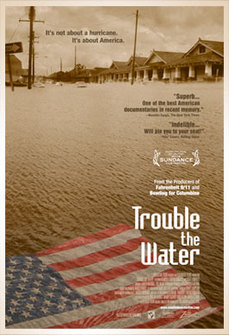CULTURE BEAT: Are you ready to trouble the water?
 More than three and a half years since Hurricane Katrina, the Gulf Coast continues to struggle with rebuilding. Millions will be reminded of the story of the 2005 disaster at the Academy Awards tonight, when Trouble the Water, a documentary shot amongst the devastation of Katrina, comes up for best documentary feature.
More than three and a half years since Hurricane Katrina, the Gulf Coast continues to struggle with rebuilding. Millions will be reminded of the story of the 2005 disaster at the Academy Awards tonight, when Trouble the Water, a documentary shot amongst the devastation of Katrina, comes up for best documentary feature. Hailed by the New York Times as "one of the best American documentaries in recent memory," Trouble the Water won the 2008 Grand Jury Prize at the Sundance Film Festival. The documentary, which depicts the experience of 9th Ward residents trapped in New Orleans during the hurricane, is directed and produced by Fahrenheit 9/11 and Bowling for Columbine producers Tia Lessin and Carl Deal. The film is based on footage shot by Kimberly Rivers Roberts, an aspiring New Orleans rap artist, as she and her husband Scott film their harrowing retreat to higher ground and the dramatic rescues of friends and neighbors. The filmmakers document the couple's return to New Orleans, revealing the devastation of their neighborhood and the repeated failures of local and national government.
In the years since Hurricane Katrina the federal government has been slow in providing for the recovery needs of the region. Activists hoped to see this trend change under the new Obama administration.
Facing South has been covering the efforts by a coalition of Gulf Coast advocates -- allied by hundreds of national and state organizations and lawmakers -- campaigning for a Gulf Coast Civic Works program, a pioneering initiative inspired by New Deal-era public works programs. If enacted, the Gulf Coast Civic Works program could quickly put 100,000 people to work rebuilding their communities at a living wage, creating jobs and training opportunities for current and displaced Gulf residents to rebuild their region's infrastructure and restore its environment. Advocates say that through the Gulf Coast Civic Works Act (H.R. 4048) the government could foster partnerships to rebuild neighborhoods across the region devastated by the hurricanes, including Alabama, Louisiana, Mississippi and Texas.
When H.R 4048 stalled as legislation in the last Congress, Gulf Coast advocates turned to the new administration for help, hoping that funding for the project would be introduced into the economic stimulus act which was signed into law last week.
While the economic stimulus is expected to deliver relief to communities across the country, with billions going toward states in the Gulf region, Gulf coat advocates were disappointed that a resolution providing for the creation, funding, and maintenance of a specific Gulf Coast Civil Works program was not included in the recovery package.
But Gulf Coast advocates are not giving up. Many in New Orleans and the Gulf still remain hopeful that the new Congress and a new administration will signal a new commitment to Gulf recovery. The activists still hope that President Obama will issue and sign an executive order creating the Gulf Coast Civic Works Project or that the Gulf Coast Civic Works Act will be reintroduced into Congress as a stand-alone bill.
They are also asking for people across the country to take action. As millions sit down to watch the Oscars tonight, one that has a large New Orleans presence, advocates are calling on people across the nation to take a moment to ask Congress to support the reintroduction of the Gulf Coast Civic Works Act.
